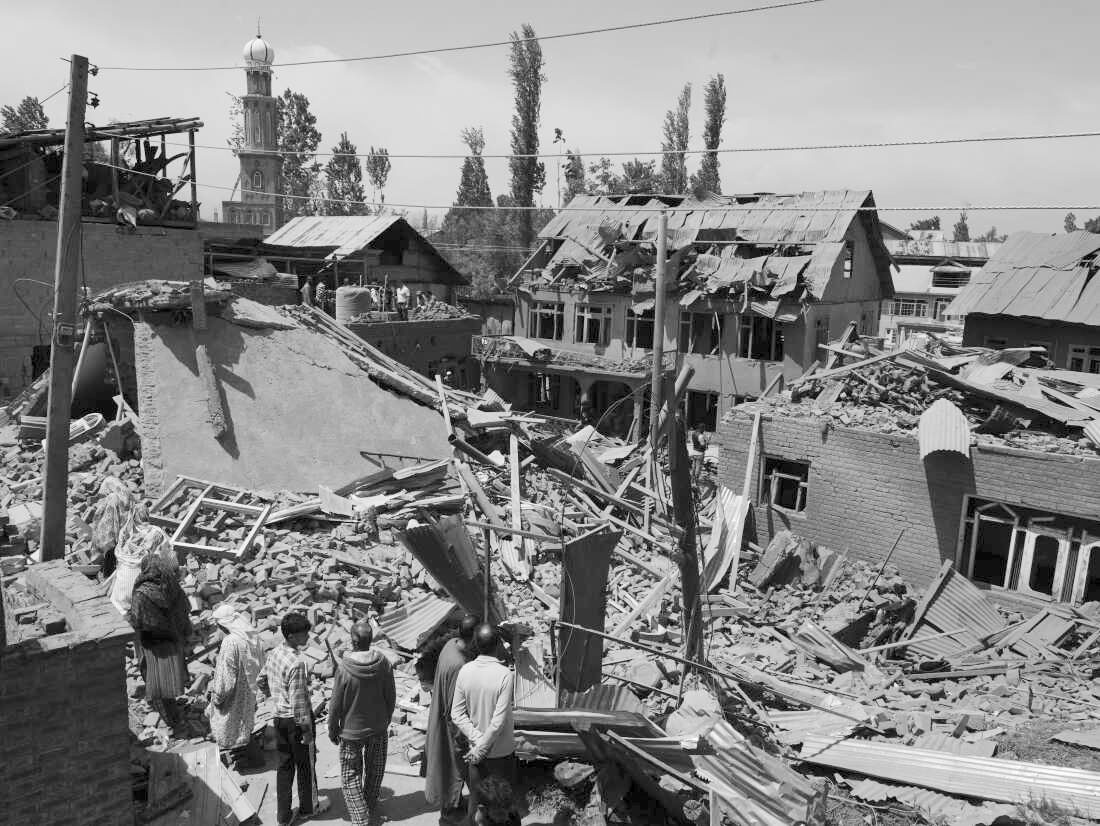
Mohammad Abass Rather
THE recent war between India and Pakistan, triggered by the dastardly terror attack in Pahalgam, has left deep and lasting scars on both sides of the border, particularly in Jammu and Kashmir’s frontier regions. Though the guns have fallen silent under a fragile ceasefire, the destruction and trauma endured by innocent civilians remain raw and unresolved.
Terror in any form is unacceptable – but war is not the answer either. This conflict has brought devastation to the doorsteps of ordinary people, those who had no role in the violence yet have borne its heaviest cost.
Common people especially those living near the Line of Control (LoC) and the international border on either side have lost their loved ones, their homes, and their peace of mind. Crops were destroyed, livestock perished, and schools had to shut down. Many families now live in fear, not knowing when the next bullet or mortar shell could fall. The psychological impact on the civilian population has been profound. The constant threat of shelling, the roar of drones overhead, the sight of displaced families, and the looming danger of further attacks have created a climate of fear and deep trauma. Schools remain closed, businesses have shuttered, daily life has come to a standstill, and the once-thriving tourism industry lies in ruins. The mental health toll is especially severe among children and the elderly, who struggle to process the violence surrounding them.
Several border districts of Jammu and Kashmir, including Poonch, Rajouri, Samba; Aeas of Kupwara, Gurez in Bandipora, Uri in Baramulla witnessed intense shelling that reduced many homes to rubble. Families not only lost shelter but also their means of livelihood. Entire villages were plunged into uncertainty, with people fleeing in search of safety.
The heartbreaking story of the twin children in Poonch who were killed in a shelling attack at an age when they were just beginning to understand the world will haunt many for years. In Uri, a woman lost her life while in a car after leaving home. These are just a few among countless stories of tragedy.
According to a report by The Hindu on May 11, since the launch of Operation Sindoor, at least 18 civilians and 7 security personnel have been killed in Jammu and Kashmir. These numbers tell a painful story of loss and suffering.
In the face of such devastation, it is now the responsibility of the government to step forward meaningfully. Rehabilitation of the affected families across all border districts must be made a top priority. A comprehensive assessment of the damage to homes, crops, and livestock should be carried out, and fair compensation must be provided.
Many families have not only lost loved ones but also their earning hands. The government must consider offering employment to the next of kin of those killed, so that they have a way to survive and rebuild. Mere condolences are not enough; these families deserve support that ensures dignity and long-term stability.
Moreover, it is essential for the Government of India to extend full assistance to the Jammu and Kashmir administration in delivering relief to the affected regions. The response must be swift, coordinated.
The people of Jammu and Kashmir, who have endured immense suffering over the past decades – often caught in the crossfire – yearn deeply for lasting peace. For that, protecting the rights of the people is the key. They do not want to live under the constant threat of different shades of violence. Their tragedies should not be ignored through indifference or silence.
It is time to listen to their voices, understand their pain, and take bold steps to initiate meaningful dialogue with all shades of opinion – to find lasting solutions to the problems that continue to haunt the minds of the people.
Experience has shown that neither terror nor war can resolve these issues — only serious and sustained dialogue offers a viable way forward.
Adverse Fallout of Indo–Pak War in Punjab
A LARGE number of people living near the Line of Control (LOC) in Punjab’s border districts – such as Pathankot, Gurdaspur, Amritsar, Tarn Taran, Ferozepur, Fazilka, and Bathinda – were forced to relocate to safer areas due to the Indo-Pak conflict.
The crisis coincided with the wheat harvesting season. Although the crops had been harvested, the sale and storage processes were disrupted. Several missiles and drones landed in fields and, in isolated cases, on buildings. While there was material damage, no human casualties were reported. Nonetheless, widespread panic persisted day and night.
Trade and other economic activities came to a halt in the border districts, and transportation was nearly paralysed. Schools, colleges, and other educational institutions across Punjab were closed. Tourism, particularly in Amritsar and surrounding areas, was also severely affected.
Residents of the border areas have suffered significant economic losses and should be compensated by the central government. At an all-party meeting convened by the Governor of Punjab, it was unanimously resolved that annual compensation to border-area farmers should be increased from the current Rs 8,000 per hectare to Rs 30,000 per hectare.
The people of Punjab have borne the brunt of previous wars – in 1965, 1971, and during the Kargil war – as well as the trauma of Partition in 1947. These experiences have made them strongly opposed to war.


